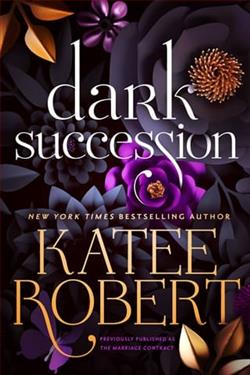Page 310 of Conveniently Wed
“No, Nora. I can’t disrupt your day like that.”
“Yes, you can. I insist,” Nora said. She expertly pulled Aundy’s long hair up and fastened it in a loose pompadour before pinning a stylish hat in place.
“My gracious, but you sure have such lovely clothes.” Nora admired Aundy’s outfit. A skirt and short jacket, in the same striking shade of light blue as Aundy’s eyes, topped a crisp white shirtwaist with thick lace around the collar and along the front. The hat, adorned with white roses, featured loops of blue ribbon that matched her stylish ensemble.
Aundy looked down and smoothed the front of her skirt with her good hand. She felt blessed to have a very nice wardrobe. Most people in a working-class family like hers wouldn’t have been able to afford the clothing she, her mother, and sister wore. Their wardrobes were a benefit of having sewing in their blood and access to quality materials.
She pulled on her gloves as they walked back to the kitchen. Nora plucked her empty basket off the table while Aundy folded the advertisement she and Dent had worked on into her reticule.
“My mother’s parents worked very hard before they moved to America. My grandfather was a tailor, serving only the most affluent clients. My grandmother was a seamstress and milliner.She rented a small space in a shop not far from my grandfather’s. One day, he happened to be walking by the shop on his way back to his store after lunch and saw my grandmother in the window. He decided to be bold, walked right in, and asked her if she would make a hat for his mother. She agreed. It didn’t take long for them to fall in love and wed.”
“What a romantic story,” Nora said, as she and Aundy climbed into the buggy and started down the lane. “So how did they end up in Chicago?”
“My grandfather decided there were fortunes to be made in America so he and my grandmother shipped what they could, sold the rest, and made arrangements to begin a new life in Chicago. One of my grandfather’s friends started a bakery there and helped them settle in with their two young daughters. They had a large shop that offered tailored men’s clothing on one side and everything a fashionably dressed woman could want on the other. My mother and aunt grew up knowing how to sew, design gowns, create hats, alter clothes flawlessly, and get the most out of a piece of yardage. They also learned how to do the fancy stitching that set their creations apart from other dress shops.”
Aundy looked around, observing hints of spring as the rolling fields and pastures began turning green. The breath she drew in carried a new, earthy aroma.
“And?” Nora asked, anxious to hear the rest of the story as they made their way to Pendleton.
“A French man came to have a suit made by my grandfather. My aunt decided right then she was going to marry the man and she did. With her new last name and the loss of her Norwegian ties, she opened her own dress shop that catered to the elite in Chicago’s social circles. Unlike my aunt, Mother fell in love with a common laborer. Despite my grandparents’ protests she married beneath her, she didn’t care. My parents were so happy and so in love. My father’s charm quickly won over mygrandparents, but he wouldn’t take a dime of their money while they were alive,” Aundy said, letting memories flood through her.
“My mother worked for my grandparents and then my aunt. Because of the skills she taught us, my sister and I both worked for Aunt Louisa, too. Ilsa does such beautiful work, she truly is talented. I don’t have the patience for all the intricate stitching. When both our parents died, I took the job in the factory because I was good at basic sewing and needed the work. The factory owners thought their employees should dress in the clothes we made, so people could see the items out and about town. A clothing allotment was part of our wages.”
Nora gave Aundy a dubious look, convinced the lovely outfit she wore did not come from a factory. The attention to detail hinted that it was handmade by someone who definitely knew her way around a needle.
Aundy smiled at Nora’s raised brow. “When my grandparents passed away, my aunt didn’t want the inventory from their store. She said it wasn’t good enough for her clientele, so we had more bolts of fabric, trims, laces, ribbons, hat forms, and sewing supplies than you could imagine. I did the basic stitching for our clothes and Ilsa made them beautiful.”
“Why didn’t your mother open her own dress shop, instead of working for your aunt?” Nora asked with open curiosity.
“Mother didn’t have a head for business and she didn’t want to deal with the clients, so she kept the arrangement with my aunt. My father agreed to use the money we inherited from my grandparents to move to a nicer apartment and to put us in better schools. Thanks to what my grandparents left us, we were well-dressed and well-educated,” Aundy said, smiling at Nora. “My mother always said a well-dressed lady who walked with confidence and spoke intelligently could go far in life. I sure hope she’s right because I’ve got a long way to go and not a lotto take me there but a few nice clothes and a determination to succeed.”
Nora laughed and teasingly bumped Aundy’s side. “If that’s what it takes, you’ll go far, honey. You’ll go far.”
When they arrived in town, Nora drove straight to the bank. She remained in the buggy while Aundy went inside. Several minutes later, Aundy left the bank, and climbed back onto the seat beside Nora, appearing quite relieved.
“That went better than I anticipated, “Aundy said. “Unlike some men around here, the banker doesn’t seem to mind dealing with a woman.”
“Grant Hill is a nice boy. He was raised by good parents, back in Philadelphia, I think,” Nora said, guiding the buggy to her favorite store. “Why don’t we do our shopping? While someone carries our purchases out to the buggy, we can run over to the newspaper office with your advertisement.”
“That sounds like a fine plan.” A look of anticipation filled Aundy’s face as Nora parked the buggy outside a large store with interesting window displays. They stopped to admire a spring scene with seed packets, baskets, and garden tools. “When do you plant a garden?”
“Not for another month or two. We have to wait until the threat of frost is past. By then, you’ll have your cast off.”
“I wonder if they have any books on gardening.” Aundy commented as they walked inside the store. A handful of women from church stood at the counter paying for their purchases and offered them a friendly greeting.
After visiting for a few moments, Nora led Aundy toward the garden supplies. “Why do you need a gardening book?”
“I’ve never planted one before and have no idea how to go about it,” Aundy said, picking up a garden trowel and trying to decide what purpose it served.
“Well, silly girl, I’ll be teaching you all about gardens, then.” Nora took the trowel out of Aundy’s hand and shook her head. “Erik always planted a garden, although none of the men liked taking care of it. He has all the tools you need, I’m sure of it. If not, you can always purchase them later. We’ll have to make a list of seeds you want to order. I have some extras, but you might want some different vegetables than what I plan to plant. Erik also has some lovely fruit trees.”
“Fruit trees? What kind of trees?” Aundy was excited at the prospect of growing her own fruit. She had a sweet tooth and being able to make pies and crisps, as well as put up preserves for winter sounded wonderful.
“A couple of cherry, some apple, and pear,” Nora said, sorting through a stack of gloves, looking for a new pair. “And peach. He brought me the loveliest peaches last summer.”
Busy dreaming about the first bite of a ripe, juicy peach, Aundy forgot where she was until someone bumped into her back, nearly knocking her into a display of baskets.
“Begging your pardon, miss,” a good-looking man said as he stepped back from her. Aundy noticed he was about her height and quite handsome with an aristocratic appeal. He probably had women whispering about him behind their hands for miles around.















